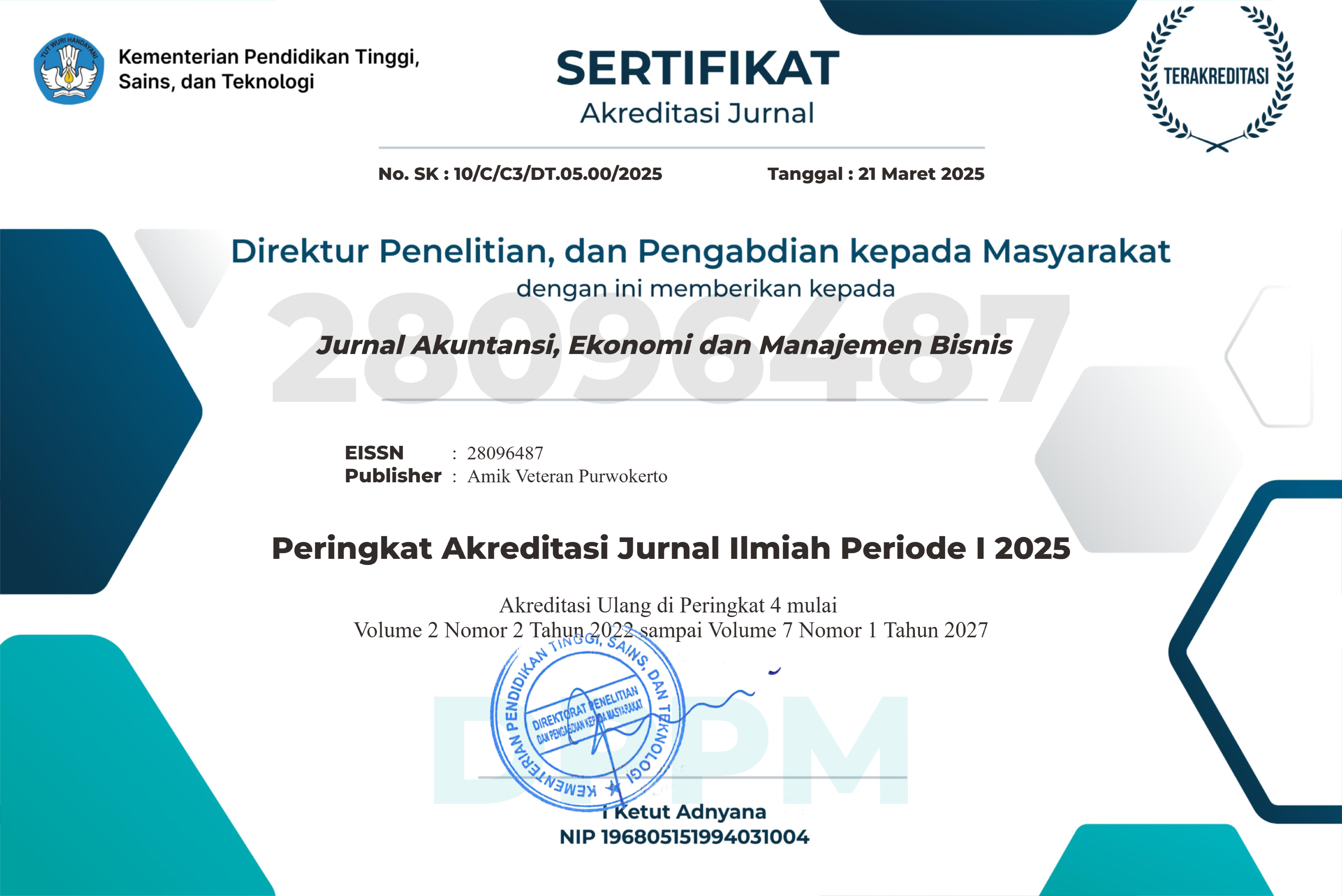Family Ownership, Family Control, and The Level of Com-pany Debt (Study on Family Business Listed on the Indone-sia Stock Exchange)
DOI:
https://doi.org/10.55606/jaemb.v5i2.6172Keywords:
Family Ownership, Family Control, Debt-to-Equity RatioAbstract
Family firms have a significant contribution to the Indonesian economy, but their financial decisions, especially regarding the use of debt, often show results that are inconsistent with existing theories. This study aims to analyze the effect of family ownership and family control on the debt level of family firms listed on the Indonesia Stock Exchange (IDX) for the period 2019–2023. This study employs a quantitative approach, utilizing a panel data regression method. The sample consists of 81 family firms selected based on certain criteria, and data obtained from annual reports published on the IDX. The dependent variable is the level of company debt, as measured by the Debt-to-Equity Ratio (DER), while the independent variables are family ownership and family control. The control variables used are company size and company age. The results show that family ownership has a positive and significant effect on DER, while family control has a negative and significant effect on DER, indicating that companies with strong family ownership and control tend to avoid the use of high debt. These findings support agency theory, which states that family involvement in the ownership and supervision of the company can reduce agency conflicts and financial risks. This study puts pressure on family firms to pay attention to ownership structure and governance in making financing decisions.
References
[1] J. Ho, C. J. Huang, and C. Karuna, “Large shareholder ownership types and board governance,” J. Corp. Financ., vol. 65, p. 101715, 2020, doi: https://doi.org/10.1016/j.jcorpfin.2020.101715.
[2] J. Yeon, M. S. Lin, S. Lee, and A. Sharma, “Does family matter? The moderating role of family involvement on the relationship between CSR and firm performance,” Int. J. Contemp. Hosp. Manag., vol. 33, no. 10, pp. 3729–3751, Jan. 2021, doi: 10.1108/IJCHM-03-2021-0315.
[3] M. Madyan, H. Meidiaswati, N. Sasikirono, and M. H. Herlambang, “Family Control, Institutional Ownership, Dan Kebijakan Dividen Perusahaan Manufaktur Yang Terdaftar Di Bursa Efek Indonesia,” J. Reviu Akunt. dan Keuang., vol. 9, no. 1, pp. 87–95, 2019, doi: 10.22219/jrak.v9i1.47.
[4] F. Margaretha and Y. Argoeby, “Faktor-Faktor Yang Mempengaruhi Kebijakan Utang Perusahaan Publik,” J. Informasi, Perpajakan, Akuntansi, Dan Keuang. Publik, vol. 4, no. 1, pp. 57–64, 2019, doi: 10.25105/jipak.v4i1.4461.
[5] M. Comino-Jurado, S. Sánchez-Andújar, and P. Parrado-Martínez, “Do dissimilarities in the family involvement in family firms lead to different levels of indebtedness? Evidence from Spain,” Manag. Decis., vol. 59, no. 12, pp. 2891–2906, 2021, doi: 10.1108/MD-05-2020-0582.
[6] A. D. Wahyunita and S. Oetama, “Pengaruh Family Ownership Dan Proporsi Anggota Keluarga Pada Dewan Direksi Terhadap Kinerja Perusahaan,” E-Jurnal Profit (Jurnal Penerapan Ilmu Manaj. dan Kewirausahaan), vol. 5, no. 2, pp. 45–58, 2020, [Online]. Available: https://jurnal.stie-sampit.ac.id/index.php/Ojs/article/view/60
[7] M. Comino-Jurado, S. Sánchez-Andújar, and P. Parrado-Martínez, “Reassessing debt-financing decisions in family firms: Family involvement on the board of directors and generational stage,” J. Bus. Res., vol. 135, pp. 426–435, 2021, doi: 10.1016/j.jbusres.2021.06.060.
[8] A. Rusaktiva and I. M. Narsa, “Good Corporate Governance: A Case Study of Family Business in Indonesia,” J. Asian Financ., vol. 8, no. 5, pp. 69–0079, 2021, doi: 10.13106/jafeb.2021.vol8.no5.0069.
[9] A. Calabrò, H. Frank, A. Minichilli, and J. Suess-Reyes, “Business families in times of crises: The backbone of family firm resilience and continuity,” J. Fam. Bus. Strateg., vol. 12, no. 2, p. 100442, 2021, doi: https://doi.org/10.1016/j.jfbs.2021.100442.
[10] J. G. Combs, K. K. Shanine, S. Burrows, J. S. Allen, and T. W. Pounds, “What Do We Know About Business Families? Setting the Stage for Leveraging Family Science Theories,” Fam. Bus. Rev., vol. 33, no. 1, pp. 38–63, Jul. 2019, doi: 10.1177/0894486519863508.
[11] E. Kahveci and B. Wolfs, “Family business, firm efficiencyand corporate governance relation: The case of corporate governance index firms in Turkey,” Acad. Strateg. Manag. J., vol. 18, no. 1, pp. 1–12, 2019.
[12] T. Sudibyo and N. Nurkhayati, “PENGARUH UKURAN PERUSAHAAN TERHADAP NILAI PERUSAHAAN DENGAN CORPORATE SOCIAL RESPONSIBILITY SEBAGAI PREDIKSI VARIABEL PEMEDIASI ( Studi Empiris perusahaan yang terdaftar di BEI),” J. PenKoMi Kaji. Pendidik. dan Ekon., vol. 7, no. 1 SE-Articles, Jan. 2024, doi: 10.33627/pk.v7i1.1743.
[13] A. Ivan and S. Raharja, “Pengaruh Kepemilikan Keluarga, Kepemilikan Institusi Dan Kepemilikan Asing Terhadap Kinerja Keuangan Perusahaan,” Diponegoro J. Account., vol. 10, no. 2, pp. 1–8, 2021, [Online]. Available: http://ejournal-s1.undip.ac.id/index.php/accounting
[14] M. Jabar, M. Kufepaksi, and N. P. Dalimunthe, “Pengaruh Manajemen Keluarga, Struktur Kepemilikan Keluarga, Struktur Modal dan Invesment Opportunity Set (IOS) Terhadap Kinerja Perusahaan (Studi pada Perusahaan Manufaktur yang Terdaftar di Bursa Efek Indonesia Periode 2017-2022),” vol. 6, no. 4 SE-Articles, May 2024, doi: 10.31004/joe.v6i4.5740.
[15] E. Latifah, S. Agung, and R. T. Rinda, “Pengaruh Motivasi Dan Kepuasan Kerja Terhadap Kinerja Karyawan,” Manag. J. Ilmu Manaj., vol. 2, no. 4, p. 566, 2020, doi: 10.32832/manager.v2i4.3811.
[16] Y. Yolanda and C. A. Utama, “Family Ownership Structure, Independent Directors, and Independent Commissioners: Effects on Leverage,” J. Manaj. Bisnis, vol. 12, no. 1, pp. 41–55, 2021, doi: 10.18196/mabis.v12i1.9525.
[17] S. Murni, Rahmawati, A. K. Widagdo, and E. A. Sudaryono, “Family control, leverage, and quality of earnings: a study on manufacturing companies in Indonesia,” Econ. Ann., vol. 200, no. 11–12, pp. 34–41, 2022, doi: 10.21003/ea.V200-06.
[18] P. T. Komalasari and M. A. Nor, “Pengaruh Struktur Kepemilikan Keluarga, Kepemimpinan Dan Perwakilan Keluarga Terhadap Kinerja Perusahaan,” AKRUAL J. Akunt., vol. 5, no. 2 SE-Articles, pp. 133–150, Apr. 2014, doi: 10.26740/jaj.v5n2.p133-150.
Downloads
Published
How to Cite
Issue
Section
License
Copyright (c) 2025 Jurnal Akuntansi, Ekonomi dan Manajemen Bisnis

This work is licensed under a Creative Commons Attribution-ShareAlike 4.0 International License.








